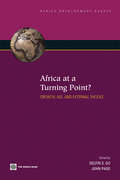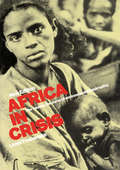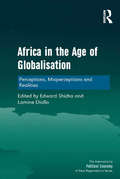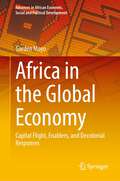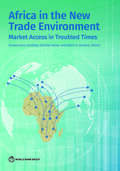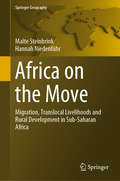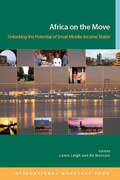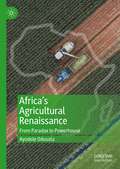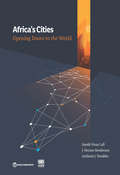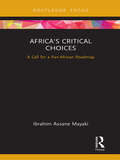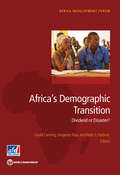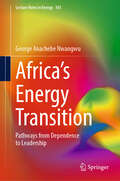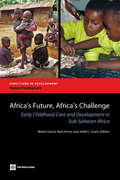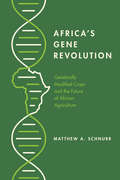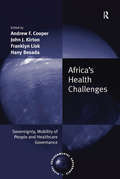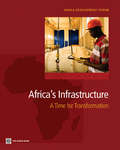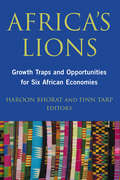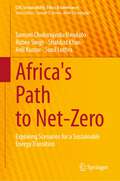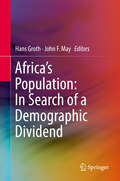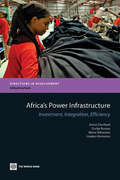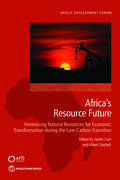- Table View
- List View
Africa at a Turning Point? Growth, Aid, and External Shocks
by John Page Delfin Sia GoSince the mid-1990s, sub-Saharan Africa has experienced an acceleration of economic growth that has produced rising incomes and faster human development. However, this growth contrasts with the continent's experience between 1975 and 1995, when it largely missed out on two decades of economic progress. This disparity between Africa's current experience and its history raises questions about the continent's development. Is there a turnaround in Africa's economy? Will growth persist? 'Africa at a Turning Point?' is a collection of essays that analyzes three interrelated aspects of Africa's recent revival. The first set of essays examines Africa's recent growth in the context of its history of growth accelerations and collapses. It seeks to answer such questions as, is Africa at a turning point? Are the economic fundamentals finally pointing toward more sustainable growth? The second set of essays looks at donor flows, which play a large role in Africa's growth. These essays focus on such issues as the management and delivery of increased aid, and the history and volatility of donor flows to Africa. The third set of essays considers the recent impact of one persistent threat to sustained growth in Africa: commodity price shocks, particularly those resulting from fluctuations in oil prices.
Africa in Crisis: The Causes and Cures of Environmental Bankruptcy
by Lloyd TimberlakeThe first edition of this incisive text on the problems of drought and famine facing Africa won worldwide critical acclaim. Revised with a new introduction, Lloyd Timberlake's bestselling study is invaluable reading for anyone interested in Africa.
Africa in Transformation: Economic Development in the Age of Doubt
by Carlos Lopes“Lopes brings his rigour, insight, and experience to this timely new book, presenting a compelling rethink of traditional development models in Africa and the need to seize on transformational change to build a sustainable future for the continent."—Kofi Annan, former United Nations Secretary General “Some readers will enjoy Lopes’ eclectic brilliance and breath-taking culture. Others will salute his ability to bring compelling new angles to every topic. Everyone will be impressed with his craftsmanship, his rich and multi-faceted approach to development, and his high ethical standards. It is impossible to read this jewel book and not feel smarter.”—Célestin Monga, African Development Bank’s Vice President and Chief Economist “Drawing on his distinguished academic career, policy experience at the highest level, and deep love of the continent, Lopes provides a visionary analysis of Africa's current problems and future prospects. This book provides a highly unusual combination of intellectualism and hard-nosed pragmatism. A singular achievement.” —Ha-Joon Chang, University of Cambridge, UK“Thorough, thought-provoking, and beyond rhetoric: definitely a must-read for anyone who wants to understand Africa’s present and future.”—Enrico Letta, former Prime Minister of Italy, Dean of the Paris School of International Affairs, Sciences Po, France Lopes delivers an overview of the critical development issues facing the African continent today. He offers readers a blueprint of policies to address issues, and an intense, heartfelt meditation on the meaning of economic development in the age of democratic doubts, identity crises, global fears and threatening issues of sustainability.
Africa in the Age of Globalisation: Perceptions, Misperceptions and Realities (The International Political Economy of New Regionalisms Series)
by Edward Shizha Lamine DialloThis is a collection of bold and visionary scholarship that reveals an insightful exposition of re-visioning African development from African perspectives. It provides educators, policy makers, social workers, non-governmental agencies, and development agencies with an interdisciplinary conceptual base that can effectively guide them in planning and implementing programs for socio-economic development in Africa. The book provides up-to-date scholarly research on continental trends on various subjects and concerns of paramount importance to globalisation and development in Africa (politics, democracy, education, gender, technology, global relationships and the role of non-governmental organisations). The authors challenge the familiar paradigms in order to show how imperfectly, if at all, assumptions about globalisation and development theories have failed in their depictions and applications to Africa. The scholars in this volume both inform and advocate for a re-visioning of perceptions on Africa and how it navigates global processes.
Africa in the Global Economy: Capital Flight, Enablers, and Decolonial Responses (Advances in African Economic, Social and Political Development)
by Gorden MoyoThis book discusses the role played by powerful global institutions such as the IMF, the World Bank, the World Trade Organisation, multinational corporations, and the international credit rating agencies in keeping Africa marginalised in the world economy. The book focuses on the intrusive roles of these institutions as enablers and beneficiaries of capital outflows and financial subordination in Africa. Diverging from the official narrative that touts China and the other emerging economies as global reformers that are poised to partner Africa in its fight against financial subjugation, the book instead argues that, like the Western powers, the emerging economies are benefiting prodigiously from a rigged global financial system that keeps Africa as a net creditor to the rest of the world. The book draws its theoretical framework from the repressed heterodox theories including dependency, core-periphery, world systems and Marxist theories as well as the decolonial approach. It concludes with a call for a decolonial African agency that should champion an epistemic rebellion against the neo-liberal and neo-classic economic traditions that have been historically deployed to justify Africa’s subordinated position in the global economic governance. This book comes at moment in time when Africa is ready to become a Rule Maker not a Rule Taker. The analysis Dr. Moyo presents having been in the front line of public policy and international negotiations demonstrate the need for Africa to re-write the rules to foster our own Transformation. Jason Rosario Braganza, Executive Director, African Forum and Network on Debt and Development (AFRODAD)
Africa in the New Trade Environment: Market Access in Troubled Times
by Souleymane Coulibaly Woubet Kassa Albert G. ZeufackSub-Saharan Africa represents only a small share of global production and trade while hosting half of the extreme poor worldwide. To catch up with the rest of the world, the continent has no alternative: it must undertake reforms to scale up its supply capacity while better linking its production and trade to the global economy. If it does so, it stands to gain from unlimited demand and innovation along the supply chain. Some progress has been made over the past decade, with the region’s exports and imports growing rapidly. Because most African economies rely heavily on trade for a large share of national income, they will also be more vulnerable to the trade disruptions of external shocks, as illustrated by the recent COVID-19 pandemic. Africa in the New Trade Environment: Market Access in Troubled Times provides a comprehensive, state-of-the-art analysis by a team of renowned trade economists who present a strategy to bolster Sub-Saharan Africa’s market access in the current global environment. It explores three key areas: • The impact of trade agreements (unilateral, regional, and multilateral) with traditional partners (the US and the EU) and a suggested way forward • The role of new market frontiers in Asia from the perspectives of both restructuring African economies and the changes in global value chains and their implications for Africa • The promise and challenges of Africa’s own regional trade and regional value chains through a well-considered and well-implemented regional integration strategy. The book meticulously explores ways to maximize Africa’s access to the two leading world markets—the EU and the US—while also diversifying its access to the emerging Asian market. Finally, it calls for an anchoring of the continent’s market access strategy in deeper intraregional trade integration. The world’s largest free trade project—the African Continental Free Trade Area—presents a major opportunity for the region’s large, resource-rich, middle-income countries to lead African firms into stronger regional and global value chain participation.
Africa on the Move: Migration, Translocal Livelihoods and Rural Development in Sub-Saharan Africa (Springer Geography)
by Malte Steinbrink Hannah NiedenführThis book discusses migration and space-spanning social network relationships as normal realities of life in African societies. It offers an overview of the research landscape and introduces an agency-centered theoretical model that provides a conceptual framework for translocality. The authors Malte Steinbrink and Hannah Niedenführ plead for a translocal approach to social transformation, showing how the translocality of livelihoods is shaping the lives of half a billion people on the continent and impacting local conditions. Using an action-oriented approach, the book analyzes the effects of translocal livelihoods on diverse aspects of economic, environmental and social change in rural Sub-Saharan Africa. The study thus makes an innovative contribution not only to migration research and development studies but also to the discussion around the policy and practice of development cooperation and planning. It is time to rethink development in light of translocal realities. The book appeals to scholars and researchers in geography, sociology, policy-making and planning, development studies, migration research and rural development.
Africa on the Move: Unlocking the Potential of Small Middle-Income States
by Lamin Leigh Ali MansoorThis publicationd escribes the reforms needed to move small middle-income countries in sub-Saharan Africa to advanced-economy status. The result of intense discussions with public officials in the countries covered, the book blends rigorous theory, econometrics, and practitioners' insights to come up with practical recommendations for policymakers. It spans topics from macroeconomic vulnerability and reserve adequacy to labor market institutions and financial inclusion. The publicaiton is a must-read for researchers interested in the economic issues facing developing countries in sub-Saharan Africa.
Africa's Agricultural Renaissance: From Paradox to Powerhouse
by Ayodele OdusolaThis book addresses the paradox between preponderance of hunger in a continent that is well endowed with fertile agricultural land, plenty of fresh water and a vibrant labor force. As some statistics show, close to 60% of arable land in the world is located in Africa which also has several rivers flowing in all seasons and plenty of underground water. The bulk of its labor force thrives on agriculture, yet the continent’s largest import item is food. 23 of 36 the most malnourished countries also belong in Africa. This has caused significant needless human suffering. This book goes beyond providing the traditional framework of supplying policy recommendations to delivering an applied, innovative framework upon which policymakers, the private sector and international institutions can take clear and deliberate action to stimulate Africa's agricultural sector, thus responding to the 2030 Agenda for Sustainable Development.
Africa's Cities: Opening Doors to the World
by Anthony J. Venables J. Vernon Henderson Somik Vinay LallCities in Sub-Saharan Africa are experiencing rapid population growth. Yet their economic growth has not kept pace. Why? One factor might be low capital investment, due in part to Africa’s relative poverty: Other regions have reached similar stages of urbanization at higher per capita GDP. This study, however, identifies a deeper reason: African cities are closed to the world. Compared with other developing cities, cities in Africa produce few goods and services for trade on regional and international markets To grow economically as they are growing in size, Africa’s cities must open their doors to the world. They need to specialize in manufacturing, along with other regionally and globally tradable goods and services. And to attract global investment in tradables production, cities must develop scale economies, which are associated with successful urban economic development in other regions. Such scale economies can arise in Africa, and they will—if city and country leaders make concerted efforts to bring agglomeration effects to urban areas. Today, potential urban investors and entrepreneurs look at Africa and see crowded, disconnected, and costly cities. Such cities inspire low expectations for the scale of urban production and for returns on invested capital. How can these cities become economically dense—not merely crowded? How can they acquire efficient connections? And how can they draw firms and skilled workers with a more affordable, livable urban environment? From a policy standpoint, the answer must be to address the structural problems affecting African cities. Foremost among these problems are institutional and regulatory constraints that misallocate land and labor, fragment physical development, and limit productivity. As long as African cities lack functioning land markets and regulations and early, coordinated infrastructure investments, they will remain local cities: closed to regional and global markets, trapped into producing only locally traded goods and services, and limited in their economic growth.
Africa's Critical Choices: A Call for a Pan-African Roadmap (Europa Regional Perspectives)
by Dunod EditeurThis volume examines contemporary Africa, a vast continent which, while entering the era of globalization, is also confronted by a number of issues, including the environment and climate change, demographics, trade issues, internal and external migration, education, economic Issues, governance, and the influence of other countries. Written by former Prime Minister of Niger and current Chief Executive Officer of the Secretariat of the New Partnership for Africa’s Development (NEPAD), Dr Ibrahim Assane Mayaki, this book offers an overview of Africa, and looks to the next generation of leaders in the continent, aiming to offer a manifesto for future change.
Africa's Demographic Transition
by David Canning Abdo S. Yazbeck Sangeeta RajaAfrica is poised on the edge of a potential takeoff to sustained economic growth. This takeoff can be abetted by a demographic dividend from the changes in population age structure. Declines in child mortality, followed by declines in fertility, produce a 'bulge' generation and a large number of working age people, giving a boost to the economy. In the short run lower fertility leads to lower youth dependency rates and greater female labor force participation outside the home. Smaller family sizes also mean more resources to invest in the health and education per child boosting worker productivity. In the long run increased life spans from health improvements mean that this large, high-earning cohort will also want to save for retirement, creating higher savings and investments, leading to further productivity gains. Two things are required for the demographic dividend to generate an African economic takeoff. The first is to speed up the fertility decline that is currently slow or stalled in many countries. The second is economic policies that take advantage of the opportunity offered by demography. While demographic change can produce more, and high quality, workers, this potential workforce needs to be productively employed if Africa is to reap the dividend. However, once underway, the relationship between demographic change and human development works in both directions, creating a virtuous cycle that can accelerate fertility decline, social development, and economic growth. Empirical evidence points to three key factors for speeding the fertility transition: child health, female education, and women's empowerment, particularly through access to family planning. Harnessing the dividend requires job creation for the large youth cohorts entering working age, and encouraging foreign investment until domestic savings and investment increase. The appropriate mix of policies in each country depends on their stage of the demographic transition.
Africa's Development in Historical Perspective
by James A. Robinson Robert H. Bates Emmanuel Akyeampong Robert H. Bates Nathan Nunn Emmanuel Akyeampong Nathan NunnThis edited volume addresses the root causes of Africa's persistent poverty through an investigation of its longue durée history. It interrogates the African past through disease and demography, institutions and governance, African economies and the impact of the export slave trade, colonialism, Africa in the world economy, and culture's influence on accumulation and investment. Several of the chapters take a comparative perspective, placing Africa's developments aside other global patterns. The readership for this book spans from the informed lay reader with an interest in Africa, academics and undergraduate and graduate students, policy makers, and those in the development world.
Africa's Energy Transition: Pathways from Dependence to Leadership (Lecture Notes in Energy #103)
by George Anachebe NwangwuThis book examines the critical challenges and opportunities surrounding climate change and the energy transition in Africa. While many Africans prioritize pressing concerns such as food scarcity, economic development, and unemployment, the book argues that the continent remains particularly vulnerable to climate-related impacts. Erratic weather patterns and extreme events exacerbate existing issues, including declining agricultural productivity, infrastructure damage, and political instability. Despite these challenges, the transition from fossil fuels to renewable energy presents significant economic opportunities for Africa. The book emphasizes that embracing this shift can help African countries transform their economies and strengthen resilience against climate change. It contends that the current international framework—where Africa has largely anchored its demands around climate justice—has yielded little tangible benefit for Africans. Instead, the book advocates for a shift in perspective: rather than focusing solely on historical emissions from the Global North, African nations should recognize the potential advantages of actively participating in the global energy economy. By seizing the opportunities inherent in this transition, African countries can reshape their economies and capitalize on emerging energy markets.
Africa's Future, Africa's Challenge: Early Childhood Care and Development in Sub-saharan Africa
by Marito H. Garcia Alan Pence Judith EvansEarly childhood, from birth through school entry, was largely invisible worldwide as a policy concern for much of the twentieth century. Children, in the eyes of most countries, were 'appendages' of their parents or simply embedded in the larger family structure. The child did not emerge as a separate social entity until school age (typically six or seven). 'Africa's Future, Africa's Challenge: Early Childhood Care and Development in Sub-Saharan Africa' focuses on the 130 million children south of the Sahel in this 0-6 age group. This book, the first of its kind, presents a balanced collection of articles written by African and non-African authors ranging from field practitioners to academicians and from members of government organizations to those of nongovernmental and local organizations. 'Africa's Future, Africa's Challenge' compiles the latest data and viewpoints on the state of Sub-Saharan Africa's children. Topics covered include the rationale for investing in young children, policy trends in early childhood development (ECD), historical perspectives of ECD in Sub-Saharan Africa including indigenous approaches, new threats from HIV/AIDS, and the importance of fathers in children's lives. The book also addresses policy development and ECD implementation issues; presents the ECD programming experience in several countries, highlighting best practices and challenges; and evaluates the impact of ECD programs in a number of countries.
Africa's Gene Revolution: Genetically Modified Crops and the Future of African Agriculture
by Matthew A. SchnurrAs development donors invest hundreds of millions of dollars into improved crops designed to alleviate poverty and hunger, Africa has emerged as the final frontier in the global debate over agricultural biotechnology. The first data-driven assessment of the ecological, social, and political factors that shape our understanding of genetic modification, Africa's Gene Revolution surveys twenty years of efforts to use genomics-based breeding to enhance yields and livelihoods for African farmers. Matthew Schnurr considers the full range of biotechnologies currently in commercial use and those in development – including hybrids, marker-assisted breeding, tissue culture, and genetic engineering. Drawing on interviews with biotechnology experts alongside research conducted with more than two hundred farmers across eastern, western, and southern Africa, Schnurr reveals a profound incongruity between the optimistic rhetoric that accompanies genetic modification technology and the realities of the smallholder farmers who are its intended beneficiaries. Through the lens of political ecology, this book demonstrates that the current emphasis on improved seeds discounts the geographic, social, ecological, and economic contexts in which the producers of these crops operate. Bringing the voices of farmers to the foreground of this polarizing debate, Africa's Gene Revolution contends that meaningful change will come from a reconfiguration not only of the plant's genome, but of the entire agricultural system.
Africa's Gene Revolution: Genetically Modified Crops and the Future of African Agriculture
by Matthew A. SchnurrAs development donors invest hundreds of millions of dollars into improved crops designed to alleviate poverty and hunger, Africa has emerged as the final frontier in the global debate over agricultural biotechnology. The first data-driven assessment of the ecological, social, and political factors that shape our understanding of genetic modification, Africa's Gene Revolution surveys twenty years of efforts to use genomics-based breeding to enhance yields and livelihoods for African farmers. Matthew Schnurr considers the full range of biotechnologies currently in commercial use and those in development - including hybrids, marker-assisted breeding, tissue culture, and genetic engineering. Drawing on interviews with biotechnology experts alongside research conducted with more than two hundred farmers across eastern, western, and southern Africa, Schnurr reveals a profound incongruity between the optimistic rhetoric that accompanies genetic modification technology and the realities of the smallholder farmers who are its intended beneficiaries. Through the lens of political ecology, this book demonstrates that the current emphasis on improved seeds discounts the geographic, social, ecological, and economic contexts in which the producers of these crops operate. Bringing the voices of farmers to the foreground of this polarizing debate, Africa's Gene Revolution contends that meaningful change will come from a reconfiguration not only of the plant's genome, but of the entire agricultural system.
Africa's Health Challenges: Sovereignty, Mobility of People and Healthcare Governance (Global Environmental Governance)
by Hany Besada Andrew F. Cooper John J. Kirton Franklyn LiskThis volume addresses the ideational and policy-oriented challenges of Africa’s health governance due to voluntary and involuntary cross-border migration of people and diseases in a growing 'mobile Africa'. The collected set of specialized contributions in this volume examines how national and regional policy innovation can address the competing conception of sovereignty in dealing with Africa’s emerging healthcare problems in a fast-paced, interconnect world.
Africa's Infrastructure: A Time for Transformation
by World BankSustainable infrastructure development is vital for Africa's prosperity. And now is the time to begin the transformation. This volume is the culmination of an unprecedented effort to document, analyze, and interpret the full extent of the challenge in developing Sub-Saharan Africa's infrastructure sectors. As a result, it represents the most comprehensive reference currently available on infrastructure in the region. The book covers the five main economic infrastructure sectors-information and communication technology, irrigation, power, transport, and water and sanitation. 'Africa's Infrastructure: A Time for Transformation' reflects the collaboration of a wide array of African regional institutions and development partners under the auspices of the Infrastructure Consortium for Africa. It presents the findings of the Africa Infrastructure Country Diagnostic (AICD), a project launched following a commitment in 2005 by the international community (after the G8 summit at Gleneagles, Scotland) to scale up financial support for infrastructure development in Africa. The lack of reliable information in this area made it difficult to evaluate the success of past interventions, prioritize current allocations, and provide benchmarks for measuring future progress, hence the need for the AICD. Africa's infrastructure sectors lag well behind those of the rest of the world, and the gap is widening. Some of the main-policy-relevant-findings highlighted in the book include the following: infrastructure in the region is exceptionally expensive, with tariffs being many times higher than those found elsewhere. Inadequate and expensive infrastructure is retarding growth by 2 percentage points each year. Solving the problem will cost over US$90 billion per year, which is more than twice what is being spent in Africa today. However, money alone is not the answer. Prudent policies, wise management, and sound maintenance can improve efficiency, thereby stretching the infrastructure dollar. There is the potential to recover an additional US$17 billion a year from within the existing infrastructure resource envelope-simply by improving efficiency. For example, improved revenue collection and utility management could generate US$3.3 billion per year. Regional power trade could reduce annual costs by US$2 billion. And deregulating the trucking industry could reduce freight costs by one-half. So, raising more funds without also tackling inefficiencies would be like pouring water into a leaking bucket. Finally, the power sector and fragile states represent particular challenges. Even if every efficiency in every infrastructure sector could be captured, a substantial funding gap of $31 billion a year would remain. Nevertheless, the African people and economies cannot wait any longer. Now is the time to begin the transformation to sustainable development.
Africa's Lions: Growth Traps and Opportunities for Six African Economies
by Finn Tarp Haroon BhoratExamining the economic forces that will shape Africa's future.Africa's Lions examines the economic growth experiences of six fast growing and/or economically dominant African countries. Expert African researchers offer unique perspectives into the challenges and issues in Ethiopia, Ghana, Kenya, Mozambique, Nigeria, and South Africa.Despite a growing body of research on African economies, very little has focused on the relationship between economic growth and employment outcomes at the detailed country level. A lack of empirical data has deprived policymakers of a robust evidence base on which to make informed decisions. By harnessing country-level household, firm, and national accounts data together with existing analytical country research-the authors have attempted to bridge this gap.The growth of the global working-age population to 2030 will be driven primarily by Africa, which means that the relationship between growth and employment should be understood within the context of each country's projected demographic challenge and the associated implications for employment growth. A better understanding of the structure of each country's workforce and the resulting implications for human capital development, the vulnerably employed, and the working poor, will be critical to informing the development policy agenda.As a group, the six countries profiled in Africa's Lions will largely shape the continent's future. Each country chapter focuses on the complex interactions between economic growth and employment outcomes, within the individual Africa's Lions context.
Africa's Oil Abundance and External Competitiveness: Do Institutions Matter?1
by Mahvash Saeed QureshiFinancial report from the IMF
Africa's Path to Net-Zero: Exploring Scenarios for a Sustainable Energy Transition (CSR, Sustainability, Ethics & Governance)
by Shahbaz Khan Anil Kumar Sunil Luthra Samuel Chukwujindu Nwokolo Rubee SinghThis book provides a comprehensive analysis of the challenges and opportunities for achieving a net-zero energy transition in Africa. With a focus on policy, technology, financing, and socio-political factors, the book presents four potential scenarios for a sustainable energy transition in the continent. The scenarios presented highlight the importance of balancing economic growth with environmental sustainability and social development. While foreign investments in renewable energy could be beneficial, they must be carefully monitored and regulated to prevent exploitation and ensure accountability. The book also emphasizes the need for collaboration and a calculated transition to ensure that all stakeholders are involved in the process. Additionally, the challenges of achieving self-sufficiency and export-free energy are discussed, with the importance of setting limitations and regulations to prevent a vicious cycle of poverty and dependency on foreign aid. With a deep understanding of Africa's environmental, socio-political, and socio-cultural complexities, “Africa's Path to Net-Zero” offers valuable insights for policymakers, investors, and anyone interested in promoting a sustainable energy future for the continent.
Africa's Population: In Search of a Demographic Dividend
by John F. May Hans GrothThis book examines the promises as well as the challenges the demographic dividend brings to sub-Saharan Africa as fertility rates in the region fall and the labor force grows. It offers a detailed analysis of what conditions must be met in order for the region to take full economic advantage of ongoing population dynamics. As the book makes clear, the region will need to accelerate reforms to cope with its demographic transition, in particular the decline of fertility. The continent will need to foster human capital formation through renewed efforts in the areas of education, health and employment. This will entail a true vision and determination on the part of African leaders and their development partners. The book will help readers to gain solid knowledge of the demographic trends and provide insights into socioeconomic policies that eventually might lead sub-Saharan Africa into a successful future.
Africa's Power Infrastructure
by Anton Eberhard Orvika Rosnes Maria Shkaratan Haakon VennemoAfrica's chronic power problems have escalated in recent years into a crisis affecting 30 countries, taking a heavy toll on economic growth and productivity. The region has inadequate generation capacity, limited electrification, low power consumption, unreliable services, and high costs. It also faces a power sector financing gap on the order of $21 billion a year. It spends only about a quarter of what it needs to spend on power, much of this on operating expenditure required to run the continent's high-cost power systems, leaving little for the huge investments needed to provide a long-term solution. Further development of regional power trade would allow Africa to harness larger scale more cost-effective energy sources, reducing energy system costs by $2 billion a year and saving 70 million tons of carbon emissions annually. Economic returns to investments in cross-border transmission are particularly high. But reaping the promise of regional trade depends on a handful of major exporting countries raising the large volumes of finance needed to develop generation capacity for export. It would also require political will in a large number of importing countries that could potentially meet more than half their power demand through trade. Power sector inefficiencies are high, deterring investment in new capacity and electrification. There are three types of sector inefficiencies. First, there are utility inefficiencies, which include system losses, under-collection of revenue and over-manning. These result in a major waste of resources adding up to $4.40 billion a year. Under-collection is the largest component of utility inefficiencies amounting to $1.73 billion, following by system losses at $1.48 billion and by over-manning at $1.15 billion. The second type of sector inefficiency is under-pricing of power. By setting tariffs below the levels needed to cover the actual costs, SSA countries forego revenues of $3.62 billion a year. The third type of inefficiency is poor budget execution. Only 66% of the capital budgets allocated to power are actually spent, with about $258 million in public investment earmarked for the power sector being diverted elsewhere in the budget. Full cost recovery tariffs would already be affordable in countries with efficient large scale hydro or coal-based systems, but not in those relying on small scale oil-based plants. Once regional power trade comes into play, generation costs will fall, and full cost recovery tariffs could be affordable in much of Africa. One of the key policy challenges is to strengthen sector planning capabilities, too often overlooked in today's hybrid markets. A serious recommitment to reforming state-owned enterprises should emphasize improvements in corporate governance more than purely technical fixes. Improving cost recovery is essential for sustaining investments in electrification and regional power generation projects. Closing the huge financing gap will require improving the creditworthiness of utilities and sustaining the recent upswing in external finance to the sector This book is based on extensive data collection undertaken between 2006 and 2008 by the Africa Country Infrastructure Country Diagnostic, an initiative of the Infrastructure Consortium for Africa delegated to the World Bank under the guidance of the African Union, African Development Bank and other multi-lateral and bilateral development institutions.
Africa's Resource Future: Harnessing Natural Resources for Economic Transformation during the Low-Carbon Transition (Africa Development Forum)
by James Cust Albert ZeufackThis book examines the role for natural resource wealth in driving Africa’s economic transformation and the implications of the low-carbon transition for resource-rich economies. Resource wealth remains central to most Sub-Saharan African economies, and significant untapped potential is in the ground. Subsoil assets—such as metals, minerals, oil, and gas—are key sources of government revenues, export earnings, and development potential in most countries in the Africa region. Despite large reserves, success in converting subsoil wealth into aboveground sustainable prosperity has been limited. Since the decline in commodity prices in 2014, resource-rich Africa has grown more slowly than the region’s average growth rate. Finding ways to more effectively harness natural resource wealth to drive economic transformation will be central to Africa’s economic future. As the world moves away from fossil fuels in alignment with commitments under the Paris Agreement, Africa’s resource-rich countries face new risks and opportunities. Recent estimates suggest that 80 percent of the world’s proven fossil fuel reserves must remain underground to meet the Paris targets, and much of these stranded reserves may be in Africa. This issue of stranded assets and, relatedly, “stranded nations,†? has major implications for the many African economies that are dependent on petroleum extraction and export. On the other hand, the energy transition will increase demand for raw material inputs involved in clean energy technologies. The transition from fossil fuels to clean energy may create demand by 2050 for 3 billion tons of minerals and metals that are needed to deploy solar, wind, and geothermal energy. How can African economies tap into these opportunities while managing the downside risk to their fossil fuel wealth? Africa’s Resource Future explores these themes and offers policy makers insights to help them navigate the coming years of uncertainty.
